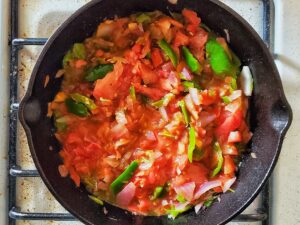Turkish Eggs Menemen

A classic Turkish egg breakfast of onions, hot peppers, tomatoes, a dash of paprika and sumac spice, feta, and a little mozzarella for some extra creaminess. Eggs are dropped in, then swirled around in a figure 8 shape, making for a Turkish breakfast mosaic like no other.
Brunch Stories
This story, like most great dishes, begins with a confluence of life and food. In the case of Shakshouka, which likely originated in Tunisian North African cuisine, the eggs are the star of the show–cracked whole into the waves of a tomato sauce based sea. The dish found its way through Middle Eastern, Mediterranean, and Israeli households, while most obviously weaving itself through the Ottoman empire.
Foodies love Shakshouka (or Shakshuka). The bright yellow and white rounds in bubbling sauce usually adorned with chunks of crumbly feta and green parsley is very pleasing to the eye. The flavors are wondrous, and it is a delicious dish.
I have had Shakshouka in well to do brunch locales in New York City and the Hudson Valley, Italian versions like “Eggs in Purgatory” (with distinct flavors of garlic, parmesan, and basil), and a homemade version of Shakshouka made with chorizo and feta.
The Turk
I happen to live with a man of Turkish origin (let’s call him my boyfriend.) His father was born and raised in Istanbul, and, through him, I have been able to more vividly explore the origin of many of my Croatian feasts, seeing them in their more pure original forms. When I prepared Shakshouka, I imagined it would spark a great familial emotion in him.
I was wrong. He liked the Shakshouka, but made sure I knew that the egg dish he had growing up in Queens and Long Island, the dish that his father still prepared when he wanted eggs, and the dish he remembered eating as a child when visiting his father’s cousins in Istanbul, was not Shakshouka, but was Menemen.
The Menemen incident occurred almost 90 years ago in a small town in Aegean Turkey when Jihadists beheaded a Turkish officer and two guards because of their affiliation with a secular regime. Also executed under then ruler Ataturk were 28 others. The “incident” is remembered to this day.

This leads us most indirectly back to the idea of confluence. History is made up of terrible events, and, as these often violent and jagged events occur, all the while citizens are still going about their business as people: falling in love, being disappointed with their lot in life, washing dishes, eating meals. There is no way to know if and how the Meneman Incident had any bearing on the name of the dish, but this alternative to Shakshouka interested me more than its photogenic not-quite-Turkish cousin.
Maybe it is because this dish is named after a bloody, illogical incident, maybe it is because my American Turk has clear memories of breakfast in Istanbul as a child, or it could just be that I am a sucker for scrambled eggs, but I’ll go ahead and say it:
I love Turkish Menemen more than its overbearing covergirl, Shakshouka.
Menemen Files
Just as Shakshouka has its basic template of onion, pepper, tomatoes/sauce, feta, and eggs, so does Menemen. Both can be dressed up with additional flavors like traditional Turkish meats (Sujuk/Sucuk, a cured salami, or Basturma/Pastirma, a cured spiced beef), or any sausage, like chorizo or merguez.
The sauce element is usually accomplished with diced fresh tomatoes, which I most prefer over canned tomatoes. Feta or goat cheese provides a creaminess, but I love the way the cheese cooks into the sauce with Menemen, whereas many love to crumble the feta over the cooked Shakshouka.
But, it is all about the eggs. While the poached eggs in Shakshouka provide a beautiful landscape for food photography, Menemen has us crack the eggs into the fresh tomato mix, then, ever so gently, twirl a fork in figure 8’s throughout the pan, breaking the yolk into the whites and intermingling the egg textures into the dish as a whole.
That fully realized amalgamation of flavors includes onion. Many Turks argue that Menemen is not Menemen with onion, while others claim that Menemen without onion is just an omelet. I agree with the second theory, but I am just a Croatian American New Yorker. The real key is the pepper–bell peppers are delicious and some use jalapeno for an additional heat, but using the closest thing one can for a Turkish green pepper–in my case, the very similar long, gnarly green peppers of the Chinese variety–brings the flavor of the dish home. I added Turkish Sucuk spiced sausage to the mix.
I side with the less photogenic underdog: Menemen. Dipping some crusty bread into a big pot of golden egg-muted red tomatoes-ivory onions-green pepper can’t be beat. And, on this lovely chilly autumn Saturday in Brooklyn, myself and my American Turk did just that.
Afiyet Olsun! “Enjoy your meal”…
…as all great breakfasts should be enjoyed–with a bit of history and childhood memory attached to it.

Turkish Eggs Menemen
Ingredients
- 1 large red onion, chopped
- 3 long green peppers (or 1 bell pepper / 2-3 jalapenos), chopped
- 4 vine tomatoes, diced (almost to the point of a sauce)
- olive oil
- ½ cup feta or goat cheese, crumbled/cubed (the Turks love feta best)
- 5 eggs
- salt, pepper, red pepper flake, paprika, sumac to taste (optional)
- ¼ cup parsley, chopped
Method
- Add oil to skillet over medium heat. Saute onion and salt until translucent, about 3-5 minutes. Add pepper and continue to mix until well incorporated.
- Add tomatoes and continue to stir at a bubbly medium heat.

-
- Add spices and bring to simmer. Cover and reduce heat for 7-10 minutes, until the tomatoes look more like a sauce and the color has deepened. Halfway through, add the feta and let cook into the sauce another few minutes.
- At a medium low heat, drop in each egg and, with a fork, begin to swirl the yolks through the whites and into the sauce, intermingling all the ingredients.

-
- Cover again for another few minutes, continuing to swirl the eggs within the mixture here and there until the eggs are a desired softness. Salt and pepper, remove from heat,and add parsley.
- Likewise, serve in its skillet and submerge same crusty bread into the eggs to eat. Forks are optional, and likely not necessary. Some nice Turkish tea can round out the breakfast, along with tomato and cucumber salad, yoghurt, and additional olives/feta so my Turk tells me.

-



